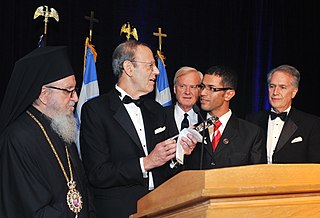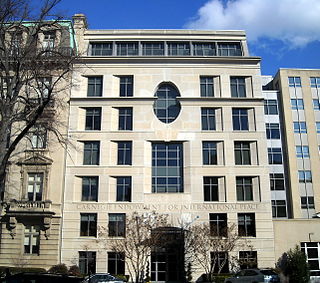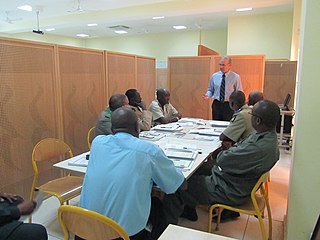
The National Endowment for Democracy (NED) is a quasi-autonomous non-governmental organization in the United States founded in 1983 with the stated aim of advancing democracy worldwide, by promoting political and economic institutions, such as political groups, trade unions, free markets, and business groups.

The Carnegie Endowment for International Peace (CEIP) is a nonpartisan international affairs think tank headquartered in Washington, D.C., with operations in Europe, South Asia, East Asia, and the Middle East, as well as the United States. Founded in 1910 by Andrew Carnegie, the organization describes itself as being dedicated to advancing cooperation between countries, reducing global conflict, and promoting active international engagement between the United States and countries around the world. It engages leaders from multiple sectors and across the political spectrum.

Winston Lord is a retired American diplomat. As Special Assistant to the National Security Advisor and then as Director of Policy Planning at the United States Department of State, Lord was a close adviser to Henry A. Kissinger and was instrumental in bringing about the renormalization of U.S.-China relations in the 1970s.

Jon Wolfsthal is an American security analyst currently serving as director of global risk at the Federation of American Scientists.

The National Democratic Institute (NDI) is a non-profit American non-governmental organization whose stated mission is to "support and strengthen democratic institutions worldwide through citizen participation, openness and accountability". It is funded primarily by the United States and other Western governments, by major corporations and by nonprofits like the Open Society Foundations.

William Joseph Burns is an American diplomat and the director of the Central Intelligence Agency (CIA) during the Biden administration since March 19, 2021. He previously served as U.S. deputy secretary of state from 2011 to 2014; in 2009 he served as acting secretary of state for a day, prior to the confirmation of Hillary Clinton. Burns retired from the U.S. Foreign Service in 2014 after a 32-year career. From 2014 to 2021, he served as president of the Carnegie Endowment for International Peace.

The Democracy Index published by the Economist Group is an index measuring the quality of democracy across the world. This quantitative and comparative assessment is centrally concerned with democratic rights and democratic institutions. The methodology for assessing democracy used in this democracy index is according to Economist Intelligence Unit which is part of the Economist Group, a UK-based private company, which publishes the weekly newspaper The Economist. The index is based on 60 indicators grouped into five categories, measuring pluralism, civil liberties, and political culture. In addition to a numeric score and a ranking, the index categorizes each country into one of four regime types: full democracies, flawed democracies, hybrid regimes, and authoritarian regimes. The first Democracy Index report was published in 2006. Reports were published every two years until 2010 and annually thereafter. The index includes 167 countries and territories, of which 166 are sovereign states and 164 are UN member states. Other democracy indices with similar assessments of the state of democracy include V-Dem Democracy indices or Bertelsmann Transformation Index.

Democracy promotion, also referred to as democracy building, can be domestic policy to increase the quality of already existing democracy or a strand of foreign policy adopted by governments and international organizations that seek to support the spread of democracy as a system of government. In practice, it entails consolidating and building democratic institutions
Viron Peter Vaky was an American diplomat who was United States Ambassador to Costa Rica (1972–74), Colombia (1974–76), and Venezuela (1976). He was a member of the American Academy of Diplomacy and Council on Foreign Relations.

Morton Isaac Abramowitz is an American diplomat and former U.S. State Department official. Starting his overseas career in Taipei, Taiwan after joining the foreign service, he served as U.S. Ambassador to Thailand and Turkey and as the Assistant Secretary of State for Intelligence and Research. He retired from the State Department with the rank of Career Ambassador. He then became president of the Carnegie Endowment for International Peace and founded the International Crisis Group.
Selig Seidenman Harrison was a scholar and journalist, who specialized in South Asia and East Asia. He was the Director of the Asia Program and a senior fellow at the Center for International Policy, and a senior scholar of the Woodrow Wilson International Center for Scholars. He was also a member of the Afghanistan Study Group. He wrote five books on Asian affairs and U.S. relations with Asia. His last book, Korean Endgame: A Strategy for Reunification and U.S. Disengagement, won the 2002 award of the Association of American Publishers for the best Professional/Scholarly Book in Government and Political Science.

Eileen Chamberlain Donahoe is an American diplomat and human rights activist who was U.S. Ambassador to the United Nations Human Rights Council, having been appointed by President Barack Obama in 2009. She was the first ambassador following the referent UN body changing from the predecessor United Nations Commission on Human Rights. After serving her term as ambassador, Donahoe was appointed as Director of Global Affairs for Human Rights Watch. In 2014, she was also appointed to the board of International Service for Human Rights. She is also an affiliate of Stanford University's Center for International Security and Cooperation, a center of the Freeman Spogli Institute for International Studies and Executive Director of the Global Digital Policy Incubator at the Freeman Spogli Institute's Cyber Policy Center working at the intersection of governance, technology and human rights.

Douglas Haines Paal is vice president for studies at the Carnegie Endowment for International Peace, where he directs the endowment's Asia Program. He served as the director of the American Institute in Taiwan from 2002 to 2006 and worked on the National Security Council staffs of Presidents Reagan and George H. W. Bush between 1986 and 1993 as director of Asian Affairs, senior director, and special assistant to the President. He was vice chairman of JPMorgan Chase International from 2006 to 2008. He also serves as a member of the board of trustees of the Asia Foundation.
Thomas Carothers is an American lawyer and international relations scholar. His research focuses on international democracy support, democratization, and U.S. foreign policy. He is a senior fellow at the Carnegie Endowment for International Peace, where he founded and currently co-directs the Democracy, Conflict, and Governance Program. He has also taught at several universities in the U.S. and Europe, including Central European University, the Johns Hopkins School of Advanced International Studies, and Nuffield College, Oxford.
A hybrid regime is a type of political system often created as a result of an incomplete democratic transition from an authoritarian regime to a democratic one. Hybrid regimes are categorized as having a combination of autocratic features with democratic ones and can simultaneously hold political repressions and regular elections. Hybrid regimes are commonly found in developing countries with abundant natural resources such as petro-states. Although these regimes experience civil unrest, they may be relatively stable and tenacious for decades at a time. There has been a rise in hybrid regimes since the end of the Cold War.
William J. "Will" Dobson is an American journalist and author who writes frequently on foreign affairs and international politics. He is the co-editor of the Journal of Democracy. Previous roles include Chief International Editor at NPR and the Politics and Foreign Affairs Editor for Slate.
Paul Thomas Haenle is an American analyst and China specialist currently serving as Maurice R. Greenberg Director’s Chair at the Carnegie Endowment for International Peace.
The International Forum for Democratic Studies (IFDS) is an analytical initiative of the National Endowment for Democracy (NED). Established in April 1994, its programs include the Journal of Democracy, the Network of Democracy Research Institutes, and fellowship programs such as the Reagan–Fascell Democracy Fellowship.
Sharp power is the use of diplomatic and political manipulation by one country to influence and undermine the political system of a target country.
Authoritarian capitalism, or illiberal capitalism, is an economic system in which a capitalist market economy exists alongside an authoritarian government. Related to and overlapping with state capitalism, a system in which the state undertakes commercial activity, authoritarian capitalism combines private property and the functioning of market forces with repression of dissent, restrictions on freedom of speech and either a lack of elections or an electoral system with a single dominant political party.











